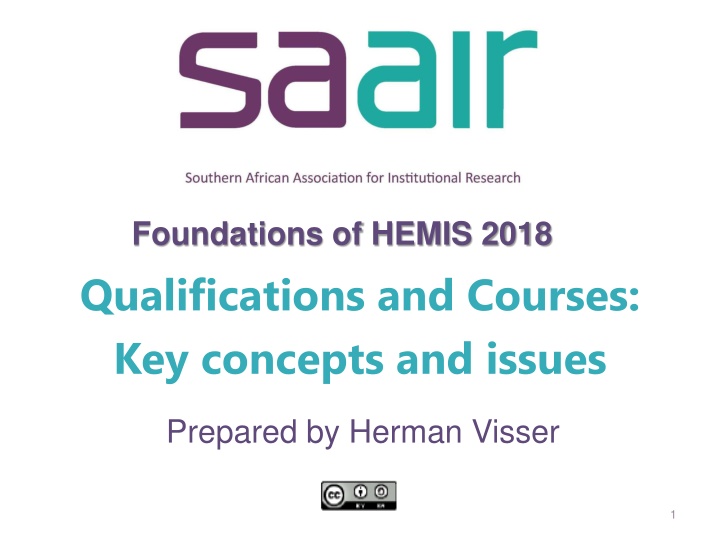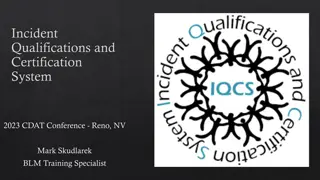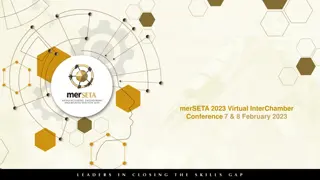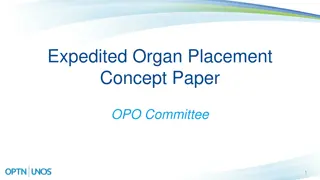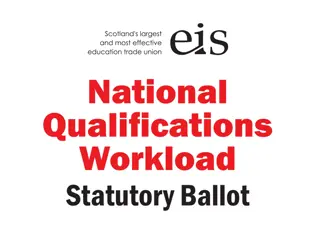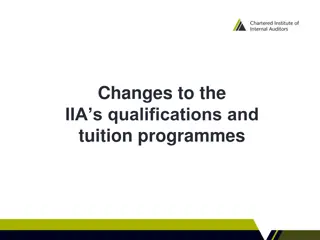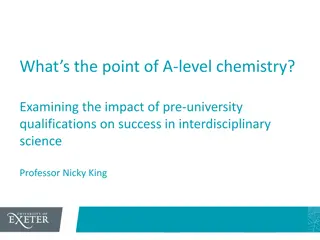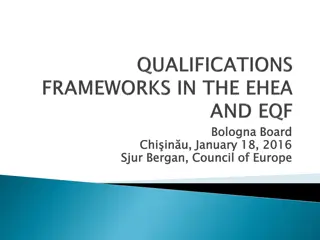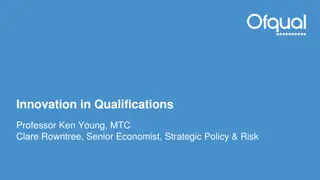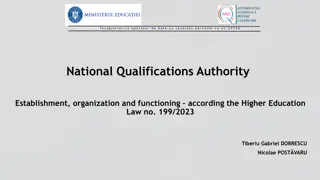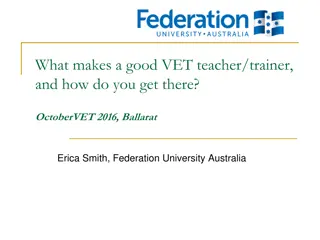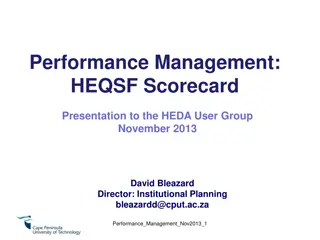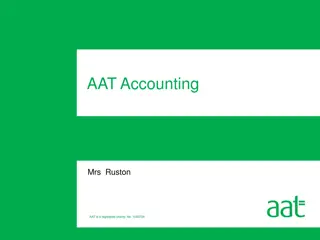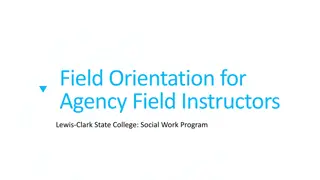Key Concepts and Issues in HEMIS Qualifications
This session delves into the nature and scope of the South African Higher Education Management Information System (HEMIS), emphasizing the significance of qualifications and courses in funding and quality assurance. The proper reporting of qualifications and courses is crucial for ensuring accuracy in educational data.
Download Presentation

Please find below an Image/Link to download the presentation.
The content on the website is provided AS IS for your information and personal use only. It may not be sold, licensed, or shared on other websites without obtaining consent from the author.If you encounter any issues during the download, it is possible that the publisher has removed the file from their server.
You are allowed to download the files provided on this website for personal or commercial use, subject to the condition that they are used lawfully. All files are the property of their respective owners.
The content on the website is provided AS IS for your information and personal use only. It may not be sold, licensed, or shared on other websites without obtaining consent from the author.
E N D
Presentation Transcript
Foundations of HEMIS 2018 Qualifications and Courses: Key concepts and issues Prepared by Herman Visser 1
Acknowledgements Council for Higher Education (CHE) documentation Department of Higher Education and Training (DHET) documentation Presentations by the author on related aspects SOUTHERN AFRICAN ASSOCIATION FOR INSTITUTIONAL RESEARCH 2
Purpose The purpose of this session is to explain the nature and scope of the South African Higher Education Management Information System (HEMIS), in particular the role of qualifications and courses SOUTHERN AFRICAN ASSOCIATION FOR INSTITUTIONAL RESEARCH
Role of Qualifications and Courses Qualifications play a very important role in funding and quality assurance Courses are the building blocks that leads to a qualification The importance of ensuring the role of qualifications and courses are properly understood cannot be emphasized enough It is critical that qualifications and course are reported correctly SOUTHERN AFRICAN ASSOCIATION FOR INSTITUTIONAL RESEARCH
Interfaces between HEMIS files QUALIFICATION FILE COURSE REGISTRATION COURSE REGISTRATION FILE FILE Qualification code Previous year qual. code Qualification name Approval status Minimum time total Min. time - experiential STUDENT FILE STUDENT FILE Student nr SA Id nr Qualification code Entrance category Date of birth Gender * Race * Nationality NSFAS status * . . . Attendance mode . . . Disability status Socio-econ status . . . % Research for M Student nr Qualification code Course code Course repeat code Funding status Course completion status Exam only Comments CREDIT VALUE FILE CREDIT VALUE FILE Qualification code Course code Course credit value Completed Res. Cred. value COURSE FILE COURSE FILE Course code Course approval status Course level code Contact/Distance/ Mixed mode Exp. learning QUALIFICATION CESM FILE QUALIFICATION CESM FILE Qualification code Major field CESM Comments
HEMIS Qualification approval status An indicator of whether or not the qualification has been approved for funding by the Minister Approved (A) / Not approved (N) Please take note of the process and links between qualifications, PQM and funding SOUTHERN AFRICAN ASSOCIATION FOR INSTITUTIONAL RESEARCH
Process for the introduction of new and revised Programmes Approval for funding DHET Information flow Registration by SAQA on NQF Accreditation/approval by the CHE Approval PQM clearance by DHET Council Senate School/Faculty/College Tuition Committees Formal proposal Academic Departments Informal discussions Original idea SOUTHERN AFRICAN ASSOCIATION FOR INSTITUTIONAL RESEARCH
Internal approval process Qualifications/Programmes Varies from institution to institution Normally initiated from academic departments Depending on the internal committee structures will be going through a number of steps before it serves at Senate as highest academic authority Final approval by Council SOUTHERN AFRICAN ASSOCIATION FOR INSTITUTIONAL RESEARCH
External approval process Qualifications/Programmes After internal approval process have been completed successfully: Obtain in principle approval (PQM clearance) from DHET to register the proposed qualification/ programme on the NQF (HEQSF) Accreditation of the proposes qualification by the CHE Registration of the proposed qualification/ programme on the NQF (HEQSF) by SAQA Obtain approval for funding purposes from DHET SOUTHERN AFRICAN ASSOCIATION FOR INSTITUTIONAL RESEARCH
Naming of Qualifications The naming of qualifications must be in line with the appropriate national academic policy applicable For the HEQSF, the qualification type is the first name given to a qualification and for degrees but not for certificates and diplomas, the designator is the second name for the qualification The approved name as on the PQM must be used for HEMIS purposes Institutions may use an internal name and provision will in future be made to capture that on HEMIS as well SOUTHERN AFRICAN ASSOCIATION FOR INSTITUTIONAL RESEARCH
Official forms Online program to capture applications Registration of Qualification (SAQA) Accreditation and Approval of Academic Qualifications (CHE) Application for Additions and Changes to Approved Academic Programmes (DHET) With minor changes (< 50%) the DHET is informed for notification purposes Updates need to be made to the Approved PQM SOUTHERN AFRICAN ASSOCIATION FOR INSTITUTIONAL RESEARCH
Internal forms Each Institution decides what is required It is useful to use the official forms plus a coversheet that contains additional information that is required in the approval process and to have the application as complete as possible SOUTHERN AFRICAN ASSOCIATION FOR INSTITUTIONAL RESEARCH
Structural integrity In order to ensure the structural integrity of the academic structure the documentation that serves at Senate and where appropriate Council and external bodies and Senate/Council Minutes and feedback documents should be used as source documents for: Calendar Updating of the Student database SOUTHERN AFRICAN ASSOCIATION FOR INSTITUTIONAL RESEARCH
Qualification type (HEQSF) Undergraduate Higher Certificate NQF exit level 5, minimum tot credits = 120 Advanced Certificate NQF exit level 6 minimum total credits 120, including PGCE Diploma NQF exit level 6 minimum total credits 240 (exceptions) or 360 Advanced Diploma NQF exit level 7, min. total credits=120 Bachelor s degree NQF exit level 7, min tot credits = 360, exception BEd NQF exit level 7, minimum total credits = 480 Bachelor s degree NQF exit level 8, min total credits = 480 Professional Bachelor s degree(exception) may follow on 1stBachelor s degree min tot credits = 240, e.g. LLB SOUTHERN AFRICAN ASSOCIATION FOR INSTITUTIONAL RESEARCH
Qualification type (HEQSF) Postgraduate Postgraduate Diploma NQF exit level 8, min tot credits = 120 Bachelor Honours Degree NQF exit level 8, minimum total credits = 120 Master s Degree NQF exit level 9, min tot credits = 180 excluding Master s degrees in Health Sciences, e.g. MMed, MedVet, MDent Professional Master s Degree NQF exit level 9, minimum total credits = 180 Doctoral Degree NQF exit level 10, min tot credits = 360 Professional Doctorate NQF exit level 10, min tot credits = 360 SOUTHERN AFRICAN ASSOCIATION FOR INSTITUTIONAL RESEARCH
Qualification type from previous dispensations Transitional arrangements may be required for qualification types offered under the HEQF and Legacy qualifications (prior to HEQF) This include, arrangements for the phasing out of qualifications from previous dispensations SOUTHERN AFRICAN ASSOCIATION FOR INSTITUTIONAL RESEARCH
HEQSF implications for HEMIS The changes to the HEQSF as published in the government gazette of January 2013 required changes in qualification types, which have been clarified and is now included in the Valpac documentation SOUTHERN AFRICAN ASSOCIATION FOR INSTITUTIONAL RESEARCH
HEQSF articulation with other Sub- Frameworks of the NQF It needs to be noted that the HEQSF articulation with other Sub-Frameworks of the NQF will have to be specified in the admissions/entrance requirements: General and Further Education and Training Qualifications Sub-Framework (GENFETQSF) Trades and Occupations Qualifications Sub-Framework (OQSF) SOUTHERN AFRICAN ASSOCIATION FOR INSTITUTIONAL RESEARCH
Category of Education Subject Matter (CESM) Subject areas are classified into 20 CESM categories (before 2010, 22 CESM categories) Each of these categories have further hierarchical subcategories (reported to the third order) Each qualification has a major field of study for the qualification Each course (subject) is linked to a CESM category (to third order) CESM categories are clustered together in funding groups for funding purposes SOUTHERN AFRICAN ASSOCIATION FOR INSTITUTIONAL RESEARCH
Major fields of study The major field(s) of study for an instructional programme can be categorized by one or more CESM categories The major field(s) of study for a particular student is/are the subject area(s) in which the student may specialize in the final year of study Can be more than one (list all) If a student has several areas of specialisation, the order in which it is reported is of no consequence SOUTHERN AFRICAN ASSOCIATION FOR INSTITUTIONAL RESEARCH
CESM Categories 01 Agriculture, etc 02 Architecture/Built Envirionment 03 Visual & Perf. Arts 04 Business, Econ, Man. 05 Communication, etc 06 Computer & Inf. Science 07 Education 08 Engineering 09 Health Sciences, etc 10 Family Ecology, Cons. Science 11 Languages 12 Law 13 Life Sciences 14 Physical Sciences 15 Mathematical Sciences 16 Military Science 17 Philosophy & Religious Studies 18 Psychology 19 Public Admin & Social services 20 Social Sciences SOUTHERN AFRICAN ASSOCIATION FOR INSTITUTIONAL RESEARCH
HEMIS Course Approval Status An indicator of whether or not a course forms part of a qualification that has been approved for funding by the Minister - Approved (A) or Not approved (N) Normally approved by the Senate of the institution to form part of a qualification A person registered for a course which has not been approved for subsidy purposes cannot be considered to be a student and must not be included in the HEMIS-submission SOUTHERN AFRICAN ASSOCIATION FOR INSTITUTIONAL RESEARCH
Process for the introduction of new and revised Courses Senate Information flow School/Faculty/College Tuition Committees Approval Formal proposal Informal discussions Academic Depart- ments Original idea SOUTHERN AFRICAN ASSOCIATION FOR INSTITUTIONAL RESEARCH
Internal forms for Courses Each Institution decides what is required No official forms required as Senate decides It is useful to make use of standardised forms and where appropriate combine it with the Forms for Qualifications/ Programmes SOUTHERN AFRICAN ASSOCIATION FOR INSTITUTIONAL RESEARCH
Structural integrity In order to ensure the structural integrity of the academic structure the documentation that serves at Senate and where appropriate Council Senate/Council Minutes and feedback documents should be used as source documents for: Calendar Updating of the Student database (academic structure) SOUTHERN AFRICAN ASSOCIATION FOR INSTITUTIONAL RESEARCH
Course levels If a course is offered at more than one level it must in all instances be reported at the lowest level that it is offered Concurrent registrations for courses at different levels are not acceptable to the DHET and must not be reported in HEMIS. Adjustments will be made in subsidy earnings totals of institutions where the FTE totals are inflated in this manner. Substantial numbers taking more than a standard course load will not be allowed Course levels on the HEQSF are aligned to NQF levels SOUTHERN AFRICAN ASSOCIATION FOR INSTITUTIONAL RESEARCH
Course Levels (HEQSF) Pre-tertiary [40] NQF level 5 [41] NQF level 6 [42] NQF level 7 [43] NQF level 8 (non-research) [44] NQF level 8 (research) [45] NQF level 9 (non-research) [46] NQF level 9 (research) [47] NQF level 10 (non-research) [48] NQF level 10 (research) [49] SOUTHERN AFRICAN ASSOCIATION FOR INSTITUTIONAL RESEARCH
Funding credits The properties of a qualification determine the total number of units of state subsidy (funding credits) approved by the Minister of Higher Education and Training for that qualification SOUTHERN AFRICAN ASSOCIATION FOR INSTITUTIONAL RESEARCH
Qualification weight/ Funding credit For subsidy-purposes, all qualifications are give a weight relative to a first bachelor s degree Student/lecturing staff ratio For subsidy-purposes, different student/lecturing staff ratios have been introduced for the different subject matter areas (funding groups) SOUTHERN AFRICAN ASSOCIATION FOR INSTITUTIONAL RESEARCH
Course Credit/ Funding Credit Each distinct instructional offering must be allocated a weight (course credit) which is the funding credit E.g. subject with papers Business Management III may consist of five topics or papers Interchangeable offerings (options) should carry the same credit or weight Calculated for qualification course combination SOUTHERN AFRICAN ASSOCIATION FOR INSTITUTIONAL RESEARCH
Calculation of the Course Credits for Teaching The course credits can then be easily calculated using the relative proportion of NQF credits for the course to the total NQF credits for the qualification ??????? ??? ?????? ????? ??????? ??? ????????????? For HEQF-qualifications, the use of NQF-credits are also recommended. For legacy qualifications, this is not possible and other methods were used. SOUTHERN AFRICAN ASSOCIATION FOR INSTITUTIONAL RESEARCH
Calculation of the Funding Credits for Teaching The funding credits for teaching offerings can be calculated using the relative proportion of the NQF credits of the course to the total NQF credits of the qualification ??????? ??? ?????? ????? ??????? ??? ?????????????X Funding credits for qualification Experiential learning is not funded and although it contribute to the total NQF credits, the funded credits for experiential learning is 0. SOUTHERN AFRICAN ASSOCIATION FOR INSTITUTIONAL RESEARCH
Calculation of the Course Credit for Research Offerings In most cases, the total credit for master s degrees are 1,000 and for doctoral degrees are 2,000. Due to the fact that the research degrees are normally spread over more than one year, a special mechanism had to be devised The total credit value are divided by the average time that students took to complete the qualification over the last three years For practical reasons, qualifications are clustered together SOUTHERN AFRICAN ASSOCIATION FOR INSTITUTIONAL RESEARCH
Calculation of the Course Credit for Research Offerings Number of graduates for the degree or cluster Number of years the graduates were enrolled = Average time for completion Credit value = Total credit value X Average time for completion Where Total credit value would typically be 1,000 for research masters and 2,000 for doctoral degrees SOUTHERN AFRICAN ASSOCIATION FOR INSTITUTIONAL RESEARCH
Applying the Graduates test to Course credits Students often do not follow the fixed curriculum and the original credit values would then have to be adjusted. This needs to be confirmed each year based on the course credits of the students that graduated in the particular degree The course credits could be adjusted per year for each degree for practical reasons An adjustment factor is then calculated that will satisfy the Graduates test (originally 2% test, later 0% test) and multiplied with the original course credits to obtain an adjusted course credit that would satisfy the Graduates Test SOUTHERN AFRICAN ASSOCIATION FOR INSTITUTIONAL RESEARCH
Implications for funding The PQM is based on approved qualifications Funding groups are based on the CESM- categories and the funding levels are based on the course levels The Teaching input funding grid of funding groups and funding levels is determined by the CESM and course level of courses Output subsidy is based on qualifications and their relative weights Qualifications and courses play a pivotal role in funding SOUTHERN AFRICAN ASSOCIATION FOR INSTITUTIONAL RESEARCH
Problem areas The allocation of CESM-categories for qualifications and courses can be problematic due to lack of clarity, ambiguous The fact that funding groups are deducted from CESM-categories further aggravates problems Course levels, NQF-levels and funding levels are not aligned in all cases - HEQSF aims to resolve this . . . SOUTHERN AFRICAN ASSOCIATION FOR INSTITUTIONAL RESEARCH
Problem areas (Continued) The allocation of course weights can be problematic Where the same course with the same NQSF-credits are offered for more than one qualification, different course credit values can create confusion The boundary between contact and distance education is not clear in all cases SOUTHERN AFRICAN ASSOCIATION FOR INSTITUTIONAL RESEARCH
Discussion and Questions SOUTHERN AFRICAN ASSOCIATION FOR INSTITUTIONAL RESEARCH
Terminology HEMIS = Higher Education Management Information System Valpac = Validation Package PQM = Programme and Qualification Mix SAQA = South African Qualifications Authority NPHE = National Plan for Higher Education MHET = Minister of Higher Education and Training DHET = Department of Higher Education and Training CESM = Categorisation of Education Subject Material CHE = Council for Higher Education NQF = National Qualification Framework NSFAS = National Student Financial Aid Scheme HEQSF = Higher Education Qualification Sub-Framework HEQC = Higher Education Quality Committee EFC = Enrolled Funded Credits also FTE = Full-Time Equivalent CFC = Completed Funded Credits WFTE = Weighted FTE TIU = Teaching Input Units TOU = Teaching Output Units ROU = Research Output Units TDG = Teaching Development Grant RDG = Research Development Grant SOUTHERN AFRICAN ASSOCIATION FOR INSTITUTIONAL RESEARCH
